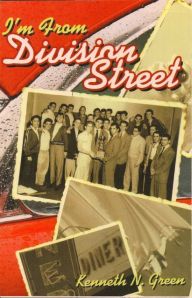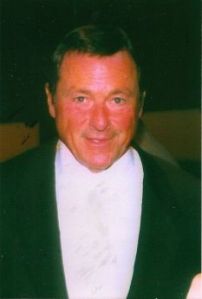
Kenneth Green rose from Chicago’s tough Humboldt Park neighborhood to find success as an L.A. lawyer and UCLA paralegal instructor. In his memoir I’m From Division Street, Green looks back at his turbulent boyhood in search of how his Humboldt Park community gave him the “grit and motivation to succeed in life” just as it did for author Saul Bellow, director Ben Hecht, reporter Art Petaque, and bandleader Benny Goodman. On Tuesday, May 3rd, you can hear Mr. Green read from I’m From Division Street when he visits EPL’s 1st Floor Community Meeting Room at 7 p.m. In anticipation of his visit, we recently spoke with him via telephone about his inspiration for writing his memoir, the differences between Chicago and L.A., the similarities between boxers and lawyers, and how often he makes it back to Division Street.
Evanston Public Library: In I’m From Division Street, you write that you never read a book growing up until you entered college. How then does it feel to have written one?
Kenneth Green: It’s hard to believe, hard to believe.
EPL: What made you want to share the story of your Division Street neighborhood and the people who lived there?
KG: I was telling my wife one day how where I’m from in Chicago people live differently then they do in L.A. The people where I’m from on Division Street are tough. They’re tough, but they’re high achievers. They have loving parents, and they just won’t quit.
EPL: You certainly showed some of that “Division Street toughness” when you joined the military after graduating from Roosevelt High School. How did growing up on Division Street help prepare you for your service in Korea?
KG: I was 18 and Jewish, and it was immediately apparent I was the only city boy. Everyone else was from the South – Tennessee, Arkansas. Being from the city, though, I had street smarts. That helped me roll with things.
EPL: After returning from Korea, you earned your A.A. from Wright Junior College and attended Roosevelt University before moving to California in 1962. Did you feel at home right away on the West Coast, or did you feel like a fish out of water?
KG: That’s exactly it. I felt like a fish out of water in L.A. First, my vocabulary was different. I spoke with a very distinctive Chicago accent. But, I also grew up with a different set of values. Let me give you an example. Shortly after I arrived in L.A., I was on a date with Miss La Jolla, and we went to a party. We walk in the door, and a guy grabs her hand and starts dancing with her. Now in my neighborhood in Chicago that would never happen even in a dream. I had to have a talk with him. West Coast people aren’t as solid as Midwesterners.
EPL: You enrolled at California State University in L.A., and shortly after earning your B.A. in History, you began teaching at Killingsworth Junior High School. As someone who got thrown out of high school, what was it like finding yourself teaching 7th grade?
KG: In 1964, my first day as a public school teacher I was terrified. I thought the kids would see right through me, think I was a fraud, know that I got thrown out of school. I was so bored in school. I would look at my teachers and just see their mouths moving and not hear a word they were saying. Because of that, I have a gift for conveying material to students in an interesting way that keeps them motivated.

EPL: While you were teaching at Killingsworth Junior High, you began attending law school. What motivated you to do so?
KG: It was a good deal to go to law school in California because they had many night schools. In Chicago, my life was pretty hard. I was driving a cab, going to school, and working another job. In California, I was able to live with my parents for a little while while I was going to school.
EPL: After passing the California Bar Exam, what was the biggest challenge you faced on the way to becoming a successful trial lawyer and public defender?
KG: When I started as a public defender in 1970, I still had a very distinctive accent. I was embarrassed. I was very inhibited. I spoke very carefully and measured every word. My mentor – the late, great Charlie English – told me that instead of fearing my background I should capitalize on it. Jurors like lawyers who stay within themselves.
EPL: Eventually you worked your way up to Bureau Chief of the L.A. County Public Defender’s Office, but you also found time to return to teaching.
KG: For 32 years, I was an adjunct professor in the paralegal program at UCLA, and I always got the highest evaluations from students. It was very gratifying to go from getting thrown out of school to being the best teacher at UCLA.
EPL: In addition to being a successful lawyer and teacher, you’re also an avid boxer who was recently inducted into the California Boxing Hall of Fame. Are you still involved with the sport? What is it that you love so much about boxing?
KG: I’m 73 years old, and I still work out once a week at the Wild Card Boxing Gym in Hollywood owned by the great trainer Freddie Roach. I box three rounds, hit the heavy bag and the speed bag, and shadow box.
I caught the boxing bug early when I sat on my father’s knee and listened to Joe Louis fight Max Schmeling on the radio. All the men I grew up with on Division Street loved boxing and fantasized about being the heavyweight champ. I love boxers. They’re a different breed. The average lawyer, if you say, “Hey Scott, how’s it going,” he’ll go on and on. Lawyers love the sound of their own voice. If you see a champion boxer working out and say “Hey Champ, how are things,” he’ll answer with one word.
EPL: Despite that difference, though, it seems as if boxing and being a trial lawyer might have some similarities.
KG: Very astute observation. They are the same because in both you go into the ring alone. You have to have toughness.
EPL: Do you still make it back to Division Street once a year?
KG: My wife and I own a condo on Lake Shore Drive, and since my book took off, I come back to Chicago about every three months. I got an email last month from a guy I haven’t seen since 7th grade grammar school. He said he saw the book and wondered if I ever came back to Chicago. I said yes, and he’s setting up a lunch with about ten guys I haven’t seen since grammar school.
EPL: Finally, what was it about Division Street that motivated so many disadvantaged people to achieve success despite the odds?
KG: Our mothers and fathers.
Interview by Russell J.
